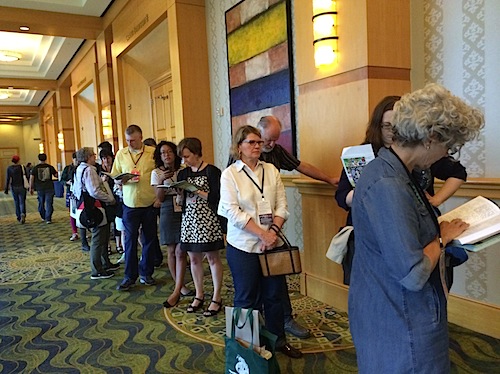[People lining up at last year’s SPX.]
Sean Gordon Murphy, a creator no stranger to speaking his mind, has offered a Creators Rights at Conventions , which includes lots of positive stories, but also some rules that suggest some not to great experiences. The rules are pretty common sense: creators as guests shouldn’t be expected to work for free and hectic schedules, and travel assistance should be offered, along with adequate hotels and some downtime to socialize with friends. Simple, yes. And definitely guidelines to be added to the playbook of any nascent con-runners, of whom there seem to be more and more. I’m not privy to any recent horror stories, but I’d suggest to any one putting on any kind of Comic-Con that what’s sauce for the Shatner is sauce for the comics guest. Comics guests usually don’t have riders for jelly beans and that kind of thing, but they shouldn’t be left entirely adrift at the airport either.
I think the free work thing is more complex, at least as far as foreign shows go. In Europe, it’s expected that guests will sketch for two or three hours at a stretch, and not little doodles, but detailed beautiful sketches. It’s a practice that has begun to wear on some creators, especially when the drawings go right up on ebay. At least one French show has officially changed its policy.
At any rate, it’s good to get these ideas out there, just in case anyone didn’t know any better. Although in that case, they shouldn’t be putting on a big event with multiple moving parts.








‘creators as guests shouldn’t be expected to work for free and hectic schedules, and travel assistance should be offered, along with adequate hotels and some downtime to socialize with friends’
If that what it takes to get them sure. Why shouldn’t they work for free if they are promoting themselves? Surely the reward in increased sales/royalties and commissions resulting from self-promotion. And don’t they get a convention fee?
‘some downtime to socialize with friends’ They’re there to work? not socialise.
‘but they shouldn’t be left entirely adrift at the airport either. ‘
This is standard practice for ‘regular’ employees who have to organise everything themselves(or maybe I’ve just been unlucky in whos hired me!!!)
I’m curious as to how comic industry guests are treated, compared to tv and movie guests. And book authors. It would seem that creators DO talk with one another, and would quickly point out the GOOD convention hosts to each other…
The first time we were guests at a con, we got a booth, a hotel room, and were reimbursed for travel. That was it, and we were pretty freaking psyched. We’re still willing to do that deal anywhere because we’re control freaks who like to plan our own trips.
It’s worth nothing that while there are about 3-4 “convention conglomerates” (Reed, Wizard, CCI, etc.) who probably have a internally-standardized system of managing and treating guests, most cons are still independently run by a couple people, and many are all-volunteer. And a lot of these con organizers don’t share information with each other. Maybe that’s where it gets tricky to establish a baseline of creator guest treatment; some cons just don’t have the resources for some amenities, like a dedicated travel guide. That said, the basic business transaction should always be clear, right? Ex: If the guest is expected to draw sketches for free, that should be negotiated in a deal memo or however these finer points are confirmed.
I’d also love to know how different guests (TV/movies, comics, literature) are treated, but that seems like something that would stay secret, since organizers undoubtedly need to sweeten the deal for the bigger attendance draws.
The way a con treats any of its guests is all very dependent on the experience of the people managing the show. If you have had a great experience at some trade show in your career then it informs what you do. As for the treatment of the ‘celebrity’ guests from TV/Movie? It is likely very different as the staff have busted tail to get that talent to agree to do the show. After going through the con development process(talent search, programming development, promotion and marketing) I can share with you that I’ve seen both ends of the spectrum. The best approach, for the con developers, is to put yourself in the shoes of your guest: how do you get to the hotel, how do you get to the venue, where is the info about the table or speaking venue, when will food be served, will there be water provided for the speaker, what sort of technology is available for presentation, and where are the bathrooms? We actually wrote these questions on a white board in our meeting and had everyone in the room respond. This made certain that we completely understood what we were asking people to do. You cant get everything right but you can do your best to make it great experience for your guest speakers.
Comments are closed.